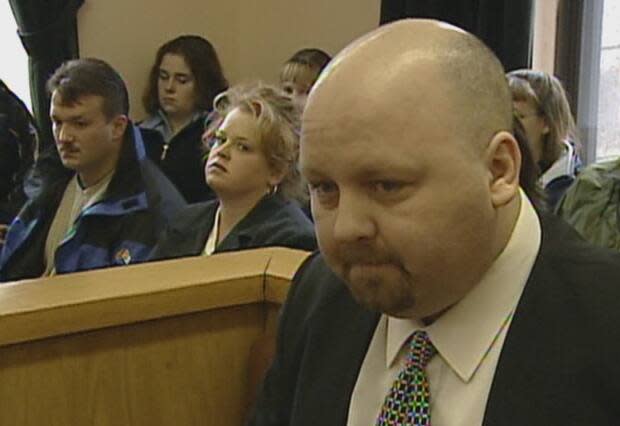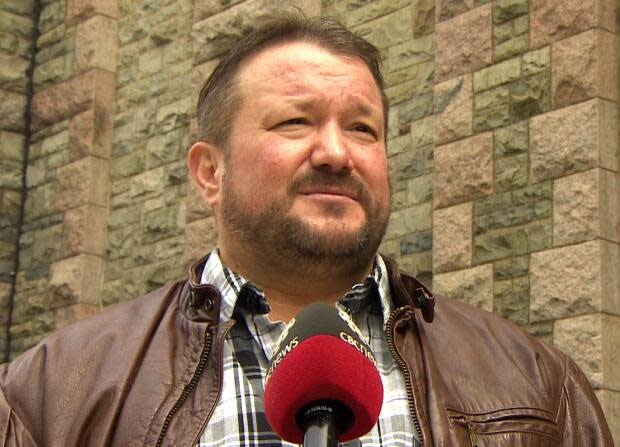Board upholds revocation of day parole for convicted murderer Brian Doyle


Convicted murderer Brian Doyle will continue to serve his life sentence behind bars.
At a hearing Friday, Parole Board of Canada member Kevin D'Souza found that the board's April decision to revoke the St. John's man's day parole was the correct one.
"The concern for me, and the board that revoked you, is the nature of the offence," said D'Souza in delivering his decision.
Doyle pleaded guilty in 2002 to second-degree murder for the brutal slaying of Catherine Carroll, whom he stabbed and slashed 53 times on New Year's Day in 1991. Carroll's son, Gregory Parsons, was wrongfully convicted of the murder and was exonerated in 1998, sparking an inquiry into Newfoundland and Labrador's judicial system.
In April 2020 Doyle was granted day parole, but it was revoked in April of this year over concerns that he failed to immediately report, per his release conditions, that he was in a relationship with a woman. It took Doyle six weeks to disclose the relationship to his parole officer. In revoking Doyle's parole, the board also questioned his honesty.
Friday's hearing again focused on Doyle's honesty while on parole.
Doyle admitted to having lied on his signout sheets from the halfway house where he was living, indicating he would be spending time with his niece but instead meeting with his partner in the relationship he did not disclose to his parole officer. Doyle said he would meet with his niece then leave to meet with his partner.
In April, Doyle said he didn't disclose the relationship to his parole officer because he didn't know it was a relationship at the time. On Friday he said he didn't disclose his relationship out of fear of being judged for having feelings of wanting a partner and "coming to terms" with who he was.
D'Souza asked Doyle why his story changed between the two hearings. Doyle blamed his own lack of character and said in April he was trying to downplay the situation.
Pointing blame

Asked how he could kill somebody despite having no history of violence, Doyle said it was a "perfect storm" that evening in 1991, and his emotions spilled out after 13 years of repressed anger, emotion and sadness. He added he didn't know how to deal with what he said was a rejection from Carroll, whom he said he had been sleeping with. Doyle began to cry, saying Carroll paid the price for "all the repressed anger."
D'Souza examined Doyle's employment history during his time on parole, noting an instance in which Doyle lied to his employer about his reason for quitting a construction job, and blamed his parole officer. Doyle said he wanted to blame someone else so he could be "the good guy" in his former employer's mind, which D'Souza suggested was like letting Parsons take the fall for Carroll's death.
Moderate risk to reoffend
Both Doyle's institutional parole officer and community parole officer said he has made progress since returning to prison, has acknowledged his mistakes, has met with a mental health team and wants to work on his emotions.
D'Souza agreed Doyle's openness is a positive step forward but given Doyle's "explosive" and "unpredictable" behaviour the night of Carroll's murder, he's concerned that the stress of being out in the community would be destabilizing for Doyle.
D'Souza also cited a psychiatric assessment of Doyle that says he is at moderate risk to reoffend, and that his deceptiveness and intimate relationships need to be monitored. D'Souza said Doyle still has a limited understanding of sexual frustration.
"The board puts a lot of weight on that," D'Souza said, noting that Doyle lied repeatedly during his maintenance program about his relationship, and admitted Friday that he clearly understood his release conditions.
Parsons read a victim impact statement at Friday's hearing.
"It takes a little piece of me, but I will never stop fighting for my mom," Parsons said as Doyle's hung his head and stared at his hands.

 Yahoo Movies
Yahoo Movies 